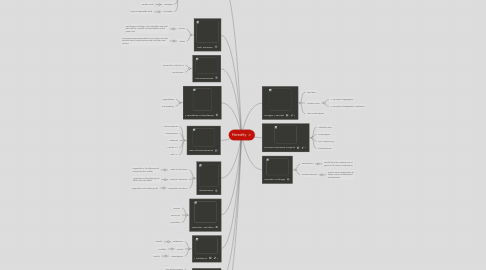
1. DNA
1.1. Double Helix
1.1.1. Adenine
1.1.2. Guanine
1.1.3. Thymine
1.1.4. Cytosine
1.2. Genes
1.2.1. Alleles
1.2.1.1. Heterozygous
1.2.1.2. Homozygous
1.2.1.3. Recessive
1.2.1.4. Dominant
1.2.2. Genotype
1.2.2.1. Genetic code
1.2.3. Phenotype
1.2.3.1. Physical observable traits
2. Cell Division
2.1. Meiosis
2.1.1. Cell division resulting in four daughter cells each with half the number of chromosomes as the parent cell
2.2. Mitosis
2.2.1. Chromosomes are separated from a nucleus into two identical sets of chromosomes each into their own nucleus
3. Chromosomes
3.1. 23 pairs for a total of 46
3.2. Centromeres
4. Mendelian Inheritance
4.1. Hybridization
4.2. True Breeding
5. Sex Chromosomes
5.1. X Chrmomosome
5.2. Y Chromosome
5.3. Autosome
5.4. Female: XX
5.5. Male: XY
6. Inheritance
6.1. Maternal Inheritance
6.1.1. Organelles in the offspring cell derive from the mother
6.2. Paternal Inheritance
6.2.1. Organelles in the offspring cell derive from the father
6.3. Biparental Inheritance
6.3.1. Organelles in the offspring cell
7. Genetic Variation
7.1. Species
7.2. Gene Pool
7.3. Populations
8. Mutations
8.1. Deleterious
8.1.1. Harmful
8.2. Neutral
8.2.1. No effect
8.3. Advantageous
8.3.1. Helpful
9. Complex Traits
9.1. High Blood Pressure
9.2. Obesity
9.3. Diabetes
9.4. Depression
10. Non-Inherited Mutations
10.1. BRCA1 Gene
10.2. URE3
11. Gregor Mendel
11.1. Pea Plants
11.2. Mendel's Laws
11.2.1. 1. Principal of Segregation
11.2.2. 2. Principal of Independent Assortment
11.3. The Punnett Square
12. Human Genome Project
12.1. Published 2003
12.2. 20,500 genes
12.3. DNA Sequencing
12.4. Electrophoresis
13. Genetic Linkage
13.1. Recombinant
13.1.1. Results from the crossing over of genes on the same chromosome
13.2. NonRecombinant
13.2.1. Has the same configuration of alleles as one of the parental chromosomes
